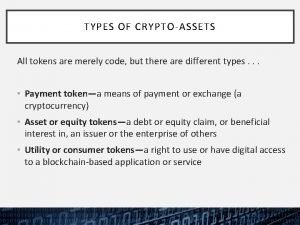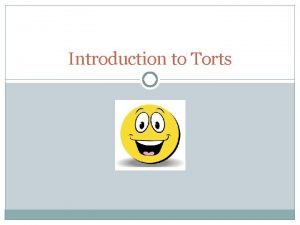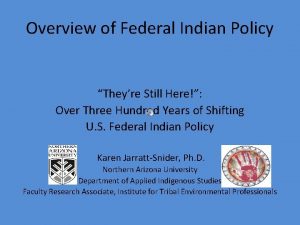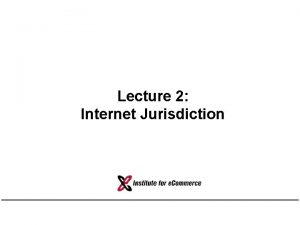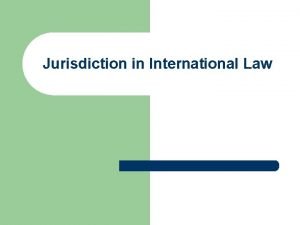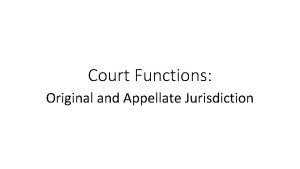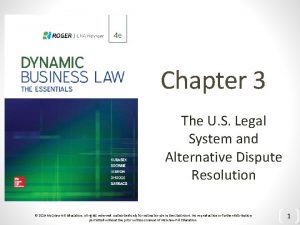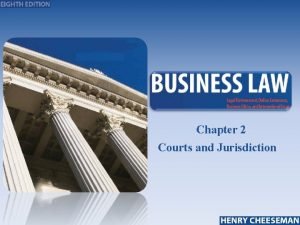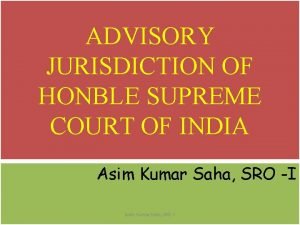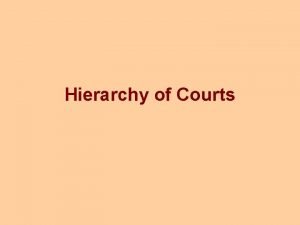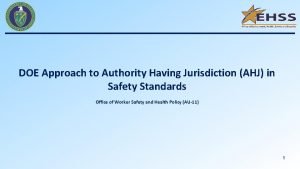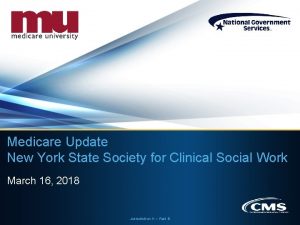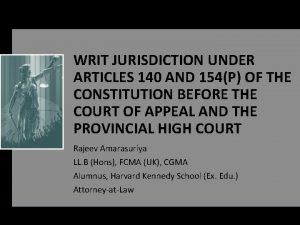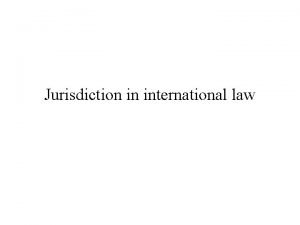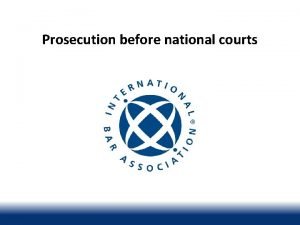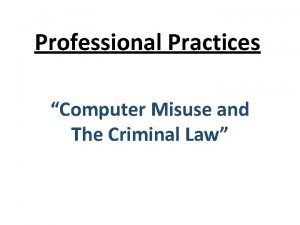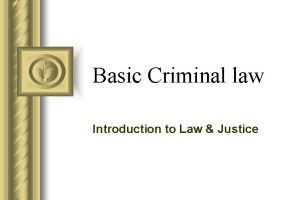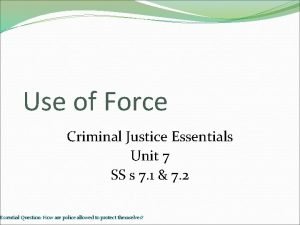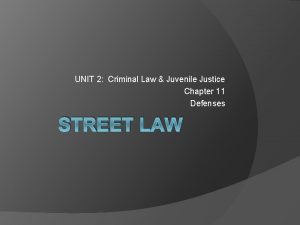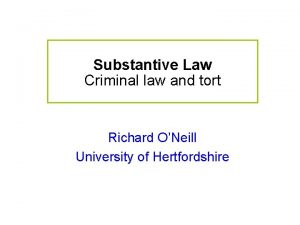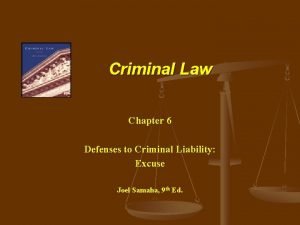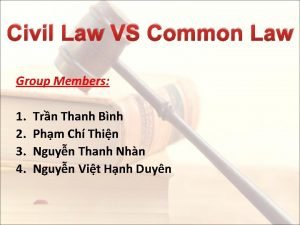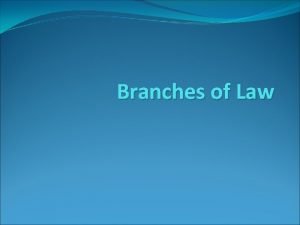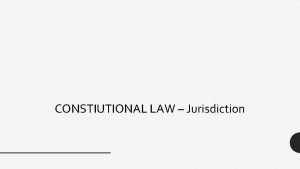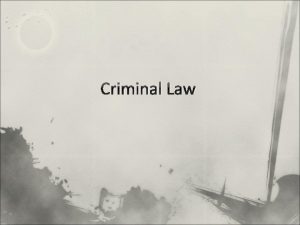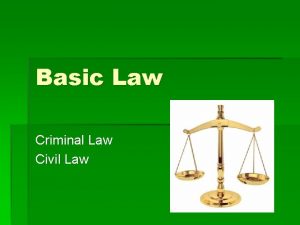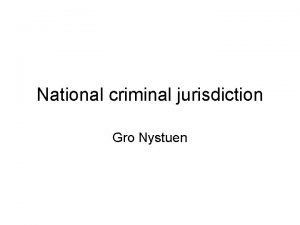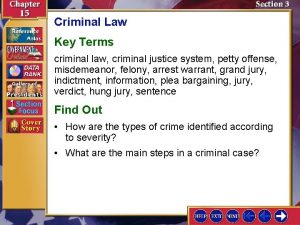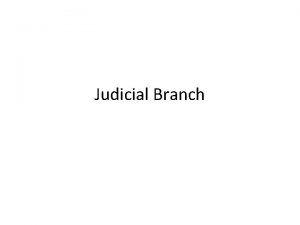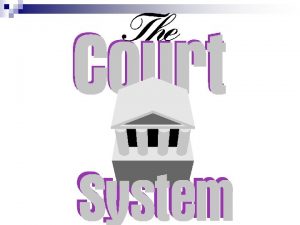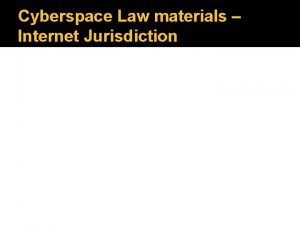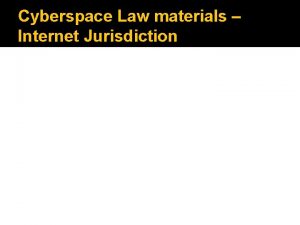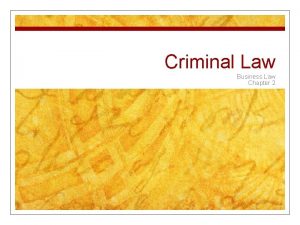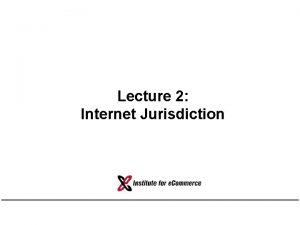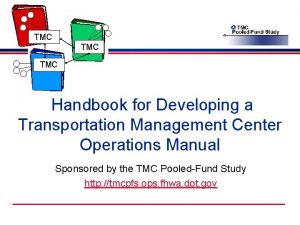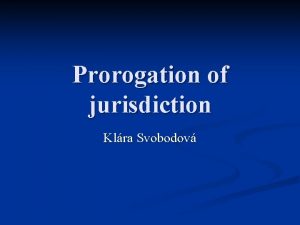Stacy Leeds Federal Indian Law I Criminal Jurisdiction





























- Slides: 29

Stacy Leeds Federal Indian Law I Criminal Jurisdiction September 10 and September 17 classes

Assimilation • End of Treaty Making (1871) – Formally but not practically • Laws for suppression of culture, language, religion – Boarding schools, crimes of culture – Crow Dog (1883) – The Major Crimes Act (1885)



Crow Dog • Indian on Indian murder in Indian Country – Federal prosecution? – Tribal prosecution? • Federal courts lack jurisdiction, why? – No source of federal law – role of tribal sovereignty? • What would give rise to future federal court jurisdiction?

Applicable Federal Law at Time of Crow Dog • any murder committed in a place “under the exclusive jurisdiction of the United States” punishable by death – Is Indian country a place “under the exclusive jurisdiction of the United States” for criminal law purposes? – Exception for Indian-on-Indian crime or any crime committed by an Indian punished by local law of the tribe?

Canons of Construction • Treaties interpreted as Indians would have understood them at that time • Ambiguities read in the light most favorable to the Indians • Liberal construction rules

Major Crimes Act of 1885 • Federal jurisdiction extended to all major crimes committed by Indians within Indian country – victim status not relevant – focus on the defendant’s status as Indian • Does not terminate tribal jurisdiction – Silence = retained powers – Practical Reality? • Concurrent tribal/federal jurisdiction

Kagama • Indian Defendants murder, inside Indian Country • Indian Victims • What is the source of power to enact statute? – Treaty? – Constitution? – Other?

Indian Country • 18 USC 1151 – A = Boundaries notwithstanding rights of way – B = Dependent Indian Communities – C = Allotments with trust or restricted status • Any one of the 3 = Indian country for criminal jurisdiction purposes – General Bar to State Jurisdiction – Defines Boundaries of Federal Jurisdiction – Defines Boundaries of Tribal Jurisdiction

Factors: Criminal Jurisdiction • Place: – Did the crime take place in Indian country? • If not, none of the special federal criminal laws apply • If not, state law applies like any other crime • People – offender Indian? – victim Indian? • Substantive Law – type of crime was committed?

Tribal Authority • With 3 exceptions, tribal power does not generally extend beyond Indian country – ICWA concurrent jurisdiction, domiciled outside Indian country – Reserved rights (like off-rez hunting or water rights) – Environmental regulation (indirectly) • Inside Indian country, tribal power over Indians is presumed – “Indians” for criminal matters – Member/citizens for civil matters

State Authority • over Indians inside Indian country, limited powers • Worcester still applies, although with modifications • Mc. Bratney = non-Indian on non-Indian crimes

Discussion • Crime takes place at a non-Indian owned store on non-Indian owned fee land on the Navajo reservation • Crime takes place at non-Indian owned store on non-Indian owned fee land within the boundaries of the former Menominee reservation • Crime takes place within territorial boundaries of Muscogee (Creek)

Examples for Discussion • Crime takes place at a non-Indian owned business on a leased trust allotment – Either on or off reservation • Crime takes place at a non-Indian owned business on restricted fee lands

Diminishment Cases • Has something happened to reduced the reservation in size? – Beyond express intent of Congress to change reservation boundaries • Courts subjective test: – loss Indian character? – Open v. closed areas of the reservation?

Disestablishment Cases • Where the boundaries of a reservation have been taken away – Express congressional action

Major Crimes Act • Federal jurisdiction • Applies Indian defendant(s) – Doesn’t matter who the victim is • Specific list of crimes

General Crimes Act (Indian Country Crimes Act) • federal jurisdiction • crime is inter-racial • Indian on non-Indian crime • Non-Indian on Indian crime • Punished by local tribal law exception

Retained Tribal Power • Crow Dog – tribes retain inherent sovereign power to prosecute Indians for crimes in Indian country • Oliphant – but tribes cannot prosecute non-Indians

Assimilative Crimes Act • Applies to federal enclaves to allow state law crime definitions - where no rules existed • Prosecution still takes place in the federal court, but the law broken in incorporated from state law • Applies when state law is prohibitory in nature, but not when regulatory

Public Law 280 • PL 280 states have same criminal jurisdiction inside and out of Indian country • Federal criminal statutes do not in mandatory PL 280 states (MCA, GCA) – Why? • Tribes have concurrent jurisdiction with the state (unless PL 280 stripped tribes of jurisdiction – But as practical matter seldom exercise it – But see the Kansas Act distinction

Defendant is Indian (any tribe) • Tribal = inherent • Federal = need a statute – MCA – GCA – ACA • State = only if PL 280

Defendant is non-Indian • Tribe = no, absent express treaty provision to contrary • Federal = need statute(s) – GCA – ACA – a federal substantive criminal statute

When Crime is Not Major • Indian defendant, tribal only

Victimless Crimes • A non-Indian and an Indian are both arrested in the same day for DUI on a state road running thru the tribe’s jurisdictional boundaries – In which court(s) could prosecute? – Under what authority?

Who is Indian? • Typically member/citizen of a federally recognized tribe • For criminal jurisdiction, may be broader: – Some Indian blood? – “Recognized” by tribe or feds? – person cannot necessarily defeat jurisdiction by change in citizenship status

Sentencing Limitations • Tribal Court sentencing is limited by federal law – ICRA 1 year and/or $5000 • With open question as to sentence “stacking” – But Tribal Law and Order Act increases • 3 yrs and/or $15, 000 • Requirements – Rt of counsel similar to US Constitution – Judicial requirements and courts of record

2013 VAWA Tribal Provisions • Jurisdiction over all persons • Special domestic violence jurisdiction
 Federal reserve jurisdiction
Federal reserve jurisdiction Federal question jurisdiction
Federal question jurisdiction What is a civil law
What is a civil law Criminal law plaintiff
Criminal law plaintiff Eras of federal indian policy
Eras of federal indian policy Ice jurisdiction
Ice jurisdiction Personal jurisdiction
Personal jurisdiction Types of jurisdiction
Types of jurisdiction Types of jurisdiction
Types of jurisdiction Jurisdiction vs venue
Jurisdiction vs venue Jurisdiction vs venue
Jurisdiction vs venue Court jurisdiction types
Court jurisdiction types Jurisdiction cacodaemonic
Jurisdiction cacodaemonic Jurisdiction of supreme court
Jurisdiction of supreme court Ahj authority having jurisdiction
Ahj authority having jurisdiction Medicare jurisdiction k
Medicare jurisdiction k Writ jurisdiction in sri lanka
Writ jurisdiction in sri lanka Ban logic
Ban logic Why jurisdiction is important
Why jurisdiction is important Commodity jurisdiction final determinations
Commodity jurisdiction final determinations Universal jurisdiction
Universal jurisdiction California coastal zone map
California coastal zone map Types of computer misuse
Types of computer misuse Social definition
Social definition Taser 7 nomenclature
Taser 7 nomenclature Chapter 11 basic concepts street law
Chapter 11 basic concepts street law Tort richard
Tort richard What is entrapment
What is entrapment Difference between civil and criminal law table
Difference between civil and criminal law table Difference between civil and criminal law table
Difference between civil and criminal law table
